Filter by
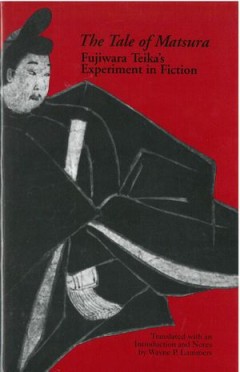
The Tale of Matsura: Fujiwara Teika’s Experiment in Fiction
Fujiwara Teika is known as the premier poet and literary scholar of the early 13th century. It is not so widely known that he also tried his hand at fiction: Mumyozoshi (Untitled Leaves; ca. 1201) refers to “several works” by Teika and then names Matsura no miya monogatari (The Tale of Matsura; ca. 1190) as the only one that can be considered successful. The work is here translated in full,…
- Edition
- -
- ISBN/ISSN
- 9780472901593
- Collation
- -
- Series Title
- -
- Call Number
- 808.9 LAM t

A Study of Crisis
As the twentieth century draws to a close, it is time to look back on an epoch of widespread turmoil, including two world wars, the end of the colonial era in world history, and a large number of international crises and conflicts. This book is designed to shed light on the causes and consequences of military-security crises since the end of World War I, in every region, across diverse economic…
- Edition
- -
- ISBN/ISSN
- 9780472903122
- Collation
- -
- Series Title
- -
- Call Number
- 337 WIL s
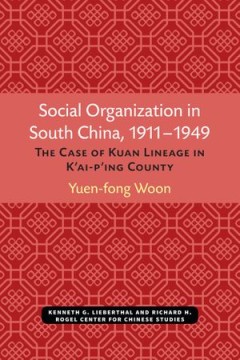
Social Organization in South China, 1911–1949: The Case of Kuan Lineage in …
Bridging the collapse of the Confucian state and the establishment of the People’s Republic of China, the period 1911–49 is particularly fascinating to historians, anthropologists, sociologists and political scientists. Unfortunately, it is also a very confusing period, full of shifts and changes in economic, social, and political organizations. The social implications of these changes, and…
- Edition
- -
- ISBN/ISSN
- 9780472902231
- Collation
- -
- Series Title
- -
- Call Number
- 301 WOO s

Frontiers of the Caribbean
The book argues that the frontier, usually associated with the era of colonial conquest, has great, continuing and under explored relevance to the Caribbean region. Identifying the frontier as a moral, ideational and physical boundary between what is imagined as civilization and wilderness, the book seeks to extend frontier analysis by focusing on the Eastern Caribbean multi island state of St.…
- Edition
- -
- ISBN/ISSN
- 9781526114921
- Collation
- -
- Series Title
- -
- Call Number
- -
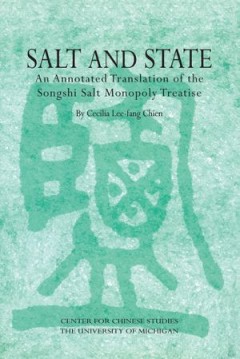
Salt and State: An Annotated Translation of the Songshi Salt Monopoly Treatise
Salt and State is an annotated translation of a treatise on salt from Song China. From its inception in the Han dynasty (206 B.C.–220 A.D.), the salt monopoly was a key component in the Chinese government's financial toolkit. Salt, with its highly localized and large-scale production, was an ideal target for bureaucratic management.In the Song dynasty (960–1279), fiscal pressures on the gov…
- Edition
- -
- ISBN/ISSN
- 9780472901456
- Collation
- -
- Series Title
- -
- Call Number
- 301 CHI s

The Red Spears, 1916–1949
Before Tai Hsüan-chih’s work on the Red Spear Society, the subject was a little understood movement that seemed of only passing interest to scholars of China—intriguing for its peculiar beliefs and rituals, perhaps, but hardly of central importance to modern Chinese history. Today, however, thanks in no small measure to the pioneering work of Professor Tai, the Red Spears have gained a sec…
- Edition
- -
- ISBN/ISSN
- 9780472901876
- Collation
- -
- Series Title
- -
- Call Number
- 302 TAI r
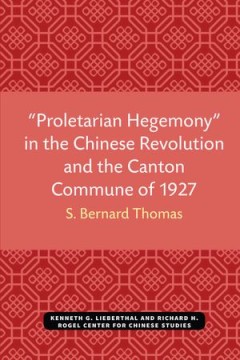
Proletarian Hegemony” in the Chinese Revolution and the Canton Commune of 1927
The Communist aim of proletarian hegemony in the Chinese revolution was given concrete expression through the Canton Commune—reflected in the policies and strategies that led to the uprising, in the makeup and program of the Soviet setup in Canton, and in the subsequent assessment of the revolt by the Comintern and the Chinese Communist Party. “Proletarian Hegemony” in the Chinese Revo…
- Edition
- -
- ISBN/ISSN
- 9780472901883
- Collation
- -
- Series Title
- -
- Call Number
- 301.951 THO p
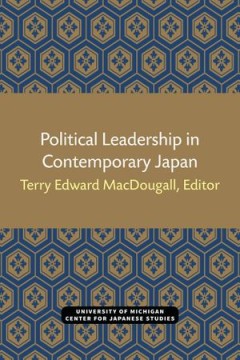
Political Leadership in Contemporary Japan
Those who do not read Japanese seldom have access to analytic studies of the fascinating and surprisingly diverse world of contemporary Japanese political leadership. This volume constitutes a step toward bringing to the English reader some sense of the norms, beliefs, styles, and modes of exercising power of Japanese political leaders and the organizational and political contexts which are cha…
- Edition
- -
- ISBN/ISSN
- 9780472901982
- Collation
- -
- Series Title
- -
- Call Number
- 320 POL p
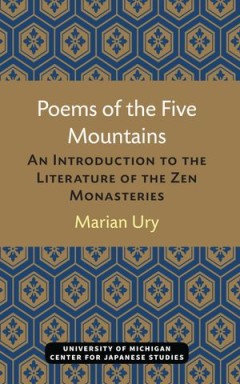
Poems of the Five Mountains: An Introduction to the Literature of the Zen Mon…
This second, revised edition of a pioneering volume, long out of print, presents translations of Japanese Zen poems on sorrow, old age, homesickness, the seasons, the ravages of time, solitude, the scenic beauty of the landscape of Japan, and monastic life. Composed by Japanese Zen monks who lived from the last quarter of the thirteenth century to the middle of the fifteenth century, these poem…
- Edition
- -
- ISBN/ISSN
- 9780472902156
- Collation
- -
- Series Title
- -
- Call Number
- 895.6 URY p
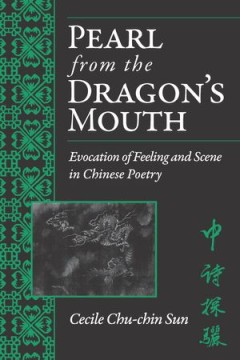
Pearl from the Dragon’s Mouth: Evocation of Scene and Feeling in Chinese Po…
The interplay between the external world (ching) and the poet’s inner world (ch’ing) lies at the heart of Chinese poetry, and understanding the interaction of the two is crucial to understanding this work from within its own tradition. Closely coordinating her discussions of poetry and criticism so that practice and theory become mutually enriching and illuminating, Sun offers sensitive and…
- Edition
- -
- ISBN/ISSN
- 9780472901357
- Collation
- -
- Series Title
- -
- Call Number
- 895.1 SUN p
 Computer Science, Information & General Works
Computer Science, Information & General Works  Philosophy & Psychology
Philosophy & Psychology  Religion
Religion  Social Sciences
Social Sciences  Language
Language  Pure Science
Pure Science  Applied Sciences
Applied Sciences  Art & Recreation
Art & Recreation  Literature
Literature  History & Geography
History & Geography